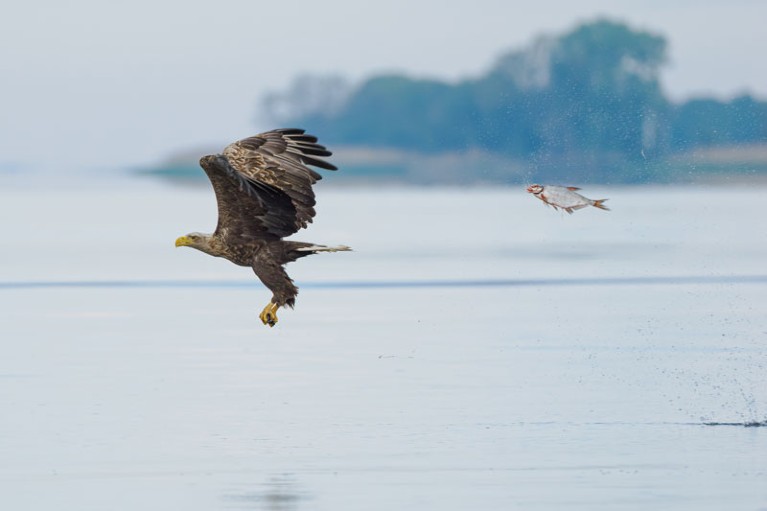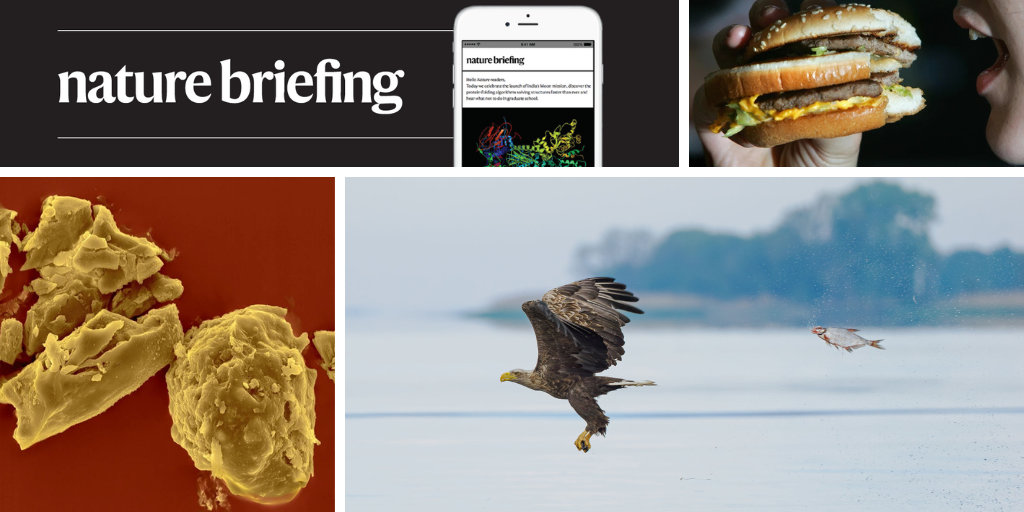Hello Nature readers, would you like to get this Briefing in your inbox free every day? Sign up here.

Credit: Przemyslaw Jakubczyk/Nikon Comedy Wildlife
The predator (seemingly) becomes the prey in this image taken by photographer Przemysław Jakubczyk. Jakubczyk captured the moment a fish leapt from Szczecin Lagoon in Poland just as an eagle flew overhead, giving it the appearance of a high-speed chase. The serendipitous snap was a finalist in this year’s Comedy Wildlife Photography Awards, a contest that showcases some of nature’s most hilarious scenes.
See more of the month’s sharpest science shots, selected by Nature’s photo team.
Chemists have synthesized a class of molecules previously thought too unstable to exist. The molecules, called anti-Bredt olefins (ABOs) contain a double bond between carbon atoms where two carbon rings join together, called the bridgehead position. The 100-year old Bredt’s rule states that this double bond was impossible, as it contorts the molecule into a strained 3D shape that makes it highly reactive and unstable. Cracking the synthesis of ABOs offers a new path to making drug candidates that were previously hard to make. “We can be thinking a little bit more outside of the box,” says chemist and study co-author Neil Garg.
Faulty insulin activity might not be driving diabetes in people with obesity, a new study hints. Instead, consuming a high-fat diet triggers a surge of neurotransmitters across the body, leading to the rapid breakdown of fatty tissue in the liver. The liberation of high levels of fatty acids is linked to a host of health conditions, from diabetes to liver failure. Mice engineered to produce fewer neurotransmitters and fed a high-fat diet gained as much weight as unmodified mice, and maintained similar insulin signalling activity, but did not develop insulin resistance. “This is indeed a paradigm shift,” says biochemist Martina Schweiger.
Reference: Cell Metabolism paper
Features & opinion
Statistician Andrew Gelman estimates that US presidential candidates Kamala Harris and Donald Trump have roughly equal chances of winning next week. But “the main value of forecasts is not in the predictions themselves, but in how they portray uncertainty and the stability of the race over time”, Gelman writes. Data-based forecasting helps scientists understand US politics, and while predictions can’t be wholly accurate, they can temper the spin put on polls by political parties. In a general election, voters might not be motivated to learn about each candidate’s positions — but they are interested in who is going to win.
A popular Buy & Sell group item gives rise to an unconventional baby in the latest short story for Nature’s Futures series.
Andrew Robinson’s pick of the top five science books to read this week includes an exploration of “how artistic methodologies intersect with experimental science to produce unique results” and a journey through the history of the vector, “a single symbol having both magnitude and direction”.
As people try to put their lives back together after devastating floods surged across southern Brazil, scientists have been investigating the best ways to help people deal with the trauma of a climate disaster. The Nature podcast this week hears from some of the affected people and researchers in the region. “What’s really important in this initial phase after a disaster is to strengthen the community so that people can rely on each other,” says Mariana Lenharo, a reporter at Nature who visited the area. “That is something that has been proven to prevent long-term mental health issues.”
Nature Podcast | 35 min listen
This story was supported by the Pulitzer Center.
Subscribe to the Nature Podcast on Apple Podcasts, Spotify or YouTube Music, or use the RSS feed.
Today, after visiting the award-winning Skipinnish Oak, Leif Penguinson is taking in the sights of Dunure Castle on the West coast of Scotland. Can you find the penguin?
The answer will be in Monday’s e-mail, all thanks to Briefing photo editor and penguin wrangler Tom Houghton.
This newsletter is always evolving — tell us what you think! Please send your feedback to [email protected].
Jacob Smith, associate editor, Nature Briefing
Want more? Sign up to our other free Nature Briefing newsletters:
• Nature Briefing: Careers — insights, advice and award-winning journalism to help you optimize your working life
• Nature Briefing: Microbiology — the most abundant living entities on our planet — microorganisms — and the role they play in health, the environment and food systems
• Nature Briefing: Anthropocene — climate change, biodiversity, sustainability and geoengineering
• Nature Briefing: AI & Robotics — 100% written by humans, of course
• Nature Briefing: Cancer — a weekly newsletter written with cancer researchers in mind
• Nature Briefing: Translational Research — covers biotechnology, drug discovery and pharma


